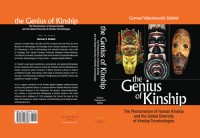Human Kinship Systems and Human Origins: A Powwow Highway from AAA to AAPA Meetings
I recently returned from the American Anthropological Association Meetings in Washington DC where I presented a paper on kinship, enjoyed the company of other members of the interdisciplinary “Kinship Circle” group led by Dwight Read and Fadwa El-Guindi, socialized with my former colleagues at the Stanford University Department of Anthropology including Bill Durham and Sylvia Yanagisako, listened to a sizzling talk by Bruno Latour on the arrival of Anthropocene and topped it off with an always-intense, long and rewarding conversation with Tad Schurr about the peopling of the Americas and the out-of-Africa debate. Upon my return I was happy to find out that my next presentation will be at the Anthropological Genetics poster session of the 84th American Anthropological Association Meetings in St. Louis, MO (March 25 – March 29, 2015). I’m very excited about it! Here’s the abstract.
Worldwide genetic variation and kinship systems: An anthropological perspective on human origins research
GERMAN V. DZIEBEL, Ph.D.
In the study of modern human origins and dispersals, kinship systems and mating patterns play an important strategic role connecting patterns of genetic variation with sociocultural and linguistic systems. While multiple studies have shown that ancient kinship systems and mating patterns likely contributed to the observable regional and global clines of genetic variation, no comprehensive study of worldwide kinship-systemic variation as it relates to genetic variation exists to date.
In a pioneering effort (Dziebel 2007), I assessed global kinship system variation on the basis of a database of 2500 kinship systems (www.kinshipstudies.org) using methodologies of social anthropology, populational and historical linguistics. Some segments of kinship terminological variation (sibling sets, cross-generational equations, etc.) yield to a global phylogenetic analysis and their unilinear evolution was tested against regional datasets (Na-Dene, Austronesian, Niger-Congo, etc.)
Strong agreement has been observed between the worldwide patterns of genetic and kinship-systemic variation. African and Amerindian patterns of kinship variation are the most divergent from each other, with African kinship systems clustering with European and Amerindian with East Asian, Papuan and Australian systems. Consistent with autosomal and haploid genetic evidence, Amerindian kinship structures indicate underlying highly structured populations, long-term low population size and density and high levels of genetic drift. Alternatively, extensive genetic differentiation in Sub-Saharan Africa corresponds to complex marital networks enabling long-range gene flow and a simplified kinship terminological profile. However, the inherent evolutionary dynamic responsible for the worldwide patterns of kinship-systemic variation is not compatible with a simple Serial-Bottleneck-Out-of-

